Why Zohran Mamdani Is Bad for New York and Dangerous for the Democratic Party
By Dr.Mohini Shinde
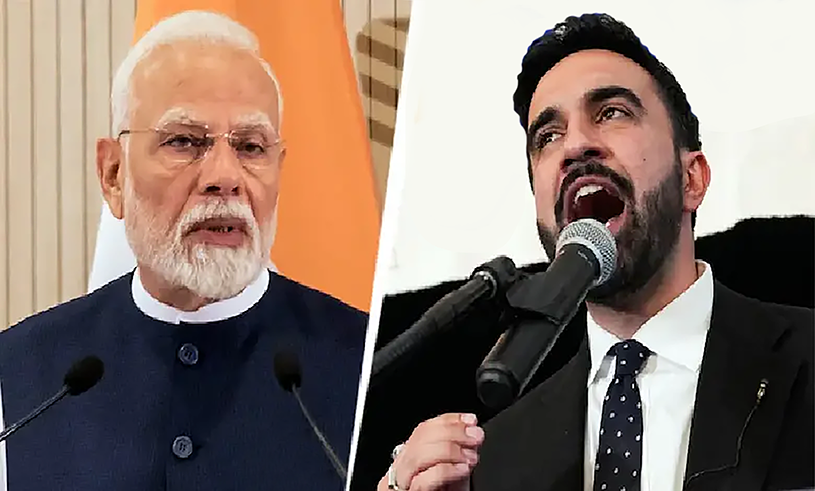
Zohran Mamdani, a 33-year-old Democratic Socialist and rising figure on the far-left flank of American politics, made national headlines by defeating former New York Governor Andrew Cuomo in the June 2025 Democratic primary—one of the most stunning political upsets in recent city history.
But far from ushering in a new era of grassroots progress, Mamdani’s ascent threatens to fracture the Democratic coalition, destabilize New York City’s economic foundation, and unravel hard-won governance norms.
Mamdani’s political identity is deeply shaped by his transnational roots. He is the son of acclaimed Indian-born filmmaker and activist Mira Nair, known globally for her socially conscious films like Salaam Bombay!, Monsoon Wedding, and The Namesake, which explore themes of identity, migration, and diaspora. His father, Mahmood Mamdani, is a Ugandan-born academic of Indian descent. With familial ties linking India, Pakistan, East Africa, and the progressive elite, Mamdani represents a unique cultural lineage—but one that often appears disconnected from the practical realities of governance and economic development in New York City.
Despite his diverse background, Mamdani’s strident views on India’s leadership, Hindu nationalism, Israel, and American foreign policy have drawn criticism from across the political spectrum. Many in the Indian-American and Jewish communities view his positions as not only divisive but overtly antagonistic toward democratic allies and traditional American values.
Questionable Ethics in College Admissions
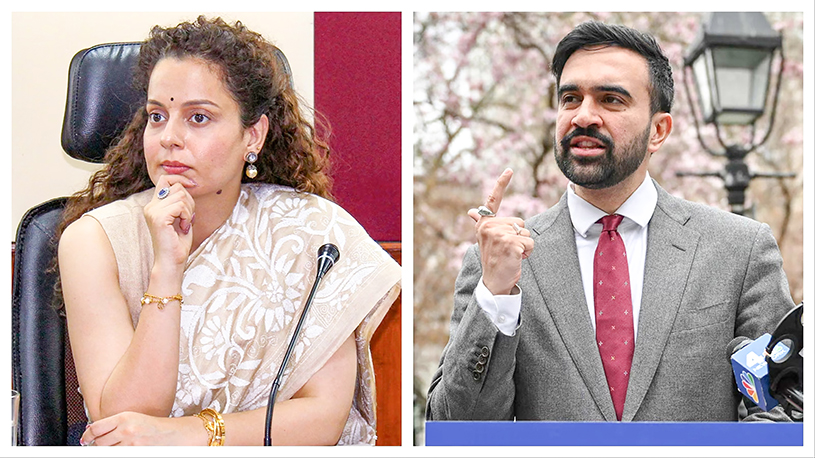
The recent article in The New York Times revealed that in 2009, Zohran Mamdani marked “Black or African American” on his Columbia University college application—despite being of Indian and Ugandan-Indian descent, with no African-American heritage. Critics argue this was a deliberate attempt to benefit from affirmative action policies intended for historically disadvantaged groups. Notably, the application form included an “Other” option, which would have more accurately reflected his complex background. By selecting a racial identity that did not apply to him, Mamdani’s action raises serious ethical questions about honesty and opportunism—particularly troubling for someone who now presents himself as a champion of social justice and equity. This decision reveals not just a lapse in judgment, but a willingness to manipulate racial identity for advantage—undermining the very values of fairness and equity.
A Platform Rooted in Ideological Extremism
Mamdani’s signature policies—rent freezes on hundreds of thousands of units, fare‑free buses, and city‑run grocery stores—sound progressive, but they mask a deeper commitment to government control over markets. Critics warn this kind of socialist experiment undermines economic efficiency and business investment.
Grocery stores: Mamdani proposes five city‑operated markets (one per borough). But producing food cheaper through government-run stores ignores thin profit margins and high logistics costs. Yale economists argue such ventures create bureaucratic inefficiencies rather than genuine consumer savings
Rent freeze: His proposal to freeze rent-stabilized apartments may appeal to renters, but real estate leaders fear capital flight once profits are capped, potentially damaging the city’s $100 billion real estate ecosystem.
This agenda pits ideological purity against pragmatic governance. Similar historic interventions in other nations have triggered investment pullbacks and job loss.
Anti-India, Anti-Modi, and Hostile Toward Hindu Sentiment
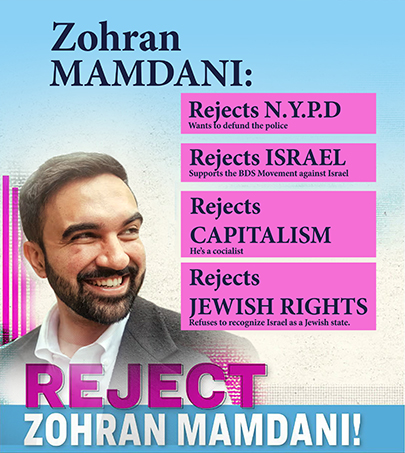
Zohran Mamdani has drawn significant criticism from Indian-American communities—especially Hindus—for his frequent, pointed attacks on Indian Prime Minister Narendra Modi and what he routinely labels as “Hindu nationalism.” While democratic discourse welcomes healthy debate, Mamdani’s rhetoric ventures far beyond principled disagreement and into dangerous demagoguery that alienates one of the most civically engaged, economically productive, and culturally cohesive immigrant communities in New York.
Mamdani’s public record includes statements denouncing India as an “authoritarian Hindu supremacist state,” betraying not just political opposition to the BJP-led government but a deeper ideological animus toward Hindu identity itself. His repeated failure to distinguish between the Indian government and the global Indian diaspora—or between Hinduism as a deeply spiritual religion and any political misuse of it—has created deep rifts among South Asians who once viewed him as a possible bridge-builder.
He has vocally supported resolutions condemning the Citizenship Amendment Act (CAA) and the abrogation of Article 370—two major reforms that received widespread support within India, including from moderates and many Muslims. Yet Mamdani’s blanket condemnations suggest a myopic and hostile worldview in which the lived realities of over a billion Indians are flattened to fit a Western ideological script.
Comparing Modi to Netanyahu: A Dangerous and False Equivalency
In one of his most inflammatory public statements, Mamdani went so far as to compare Indian Prime Minister Narendra Modi to Israeli Prime Minister Benjamin Netanyahu, claiming that Modi should be viewed as a “war criminal” just like his Israeli counterpart. Such comparisons are not only diplomatically reckless but factually indefensible, considering the democratic mandates under which both leaders were elected and the vastly different geopolitical contexts of their respective nations.
To equate India—the world’s largest democracy—with an apartheid regime narrative exposes Mamdani’s extreme ideological lens, one that selectively targets democratically elected leaders in the Global South while downplaying or ignoring the broader complexities of governance, national security, and public consensus.
False Claims About Gujarat Muslims: Outrage from Community and Analysts
Mamdani further courted outrage when he falsely claimed that “only a few Muslims remain in Gujarat” after the 2002 riots. This egregious assertion was swiftly debunked by political analyst Omer Ghazi, who responded:
“Mamdani’s statements are not only provocative and false, [but] insult the 6-million-plus vibrant Muslim population in Gujarat by denying their existence. This shows Mamdani will lie through his teeth for his ideological goals.”
Indeed, Gujarat’s Muslim population today exceeds six million, with thriving communities across cities like Ahmedabad, Surat, and Vadodara. By spreading disinformation, Mamdani insults both the victims of 2002 and the millions of peaceful Muslims who continue to live and thrive in the state.
Backlash from Hindu-Americans and Liberal Critics Alike
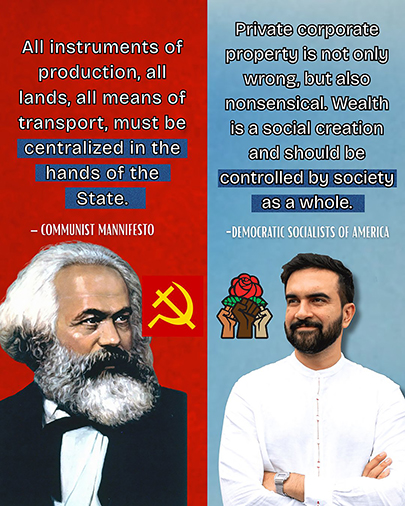 Mamdani’s statements have been sharply condemned not only by conservatives but also by liberal Indian-Americans who see his agenda as dangerously divisive.
Mamdani’s statements have been sharply condemned not only by conservatives but also by liberal Indian-Americans who see his agenda as dangerously divisive.
BJP MP Kangana Ranaut responded strongly, stating that Mamdani “sounds more Pakistani than Indian,” referencing his tendency to echo Islamabad’s rhetoric about Kashmir and Indian Muslims.
Even self-identified liberal and New York-based Indian-American educator Indu Viswanathan was unsparing in her criticism. In a widely shared tweet, she said:
“I question his integrity because he blatantly lies, and he blatantly lies because he will be rewarded for lying. His lies fit neatly into a narrative that he can ride to the mayor’s office. The ease with which people are willing to reduce entire groups of New Yorkers to immoral actors, unless we acquiesce to their narrative about us, is the kind of bullshit that no real New Yorker would or should put up with. Nor should anyone who believes integrity still matters in public life.”
Viswanathan further described Mamdani as “a projection of an illiberal, anti-intellectual left-wing authoritarianism that has sunk its teeth into progressive politics,” reinforcing the perception that Mamdani’s rise represents not progressivism but ideological extremism cloaked in social justice rhetoric.
A Fractured Candidacy that Undermines Inclusion
Mamdani’s approach has led to growing alarm among Indian-American Democrats who see his politics as exclusionary, doctrinaire, and ultimately corrosive to coalition-building. His failure to honor cultural distinctions, religious sensitivities, or the legitimacy of diverse political opinions within the South Asian community undermines any claim he might have to true representation.
Instead of uniting diverse constituencies, Mamdani appears committed to sowing division—pitting Hindus against Muslims, Indian-Americans against their own heritage, and progressives against other progressives unwilling to toe his hardline agenda.
Backlash from Business + Finance
Wall Street and real estate sectors have reacted sharply. Following his primary victory, developers and landlords expressed panic; some are reportedly relocating operations out of New York .
Economists fear a mass exodus of capital—banks, hedge funds, tech firms—moving to lower-tax states like Texas and Florida. Without corporate presence, the city’s tax base and job market could hemorrhage. A Time analysis described such outcomes under socialism as “impractical, economically harmful”.
Concerns About Governance and Experience
Running a city with a $100 billion budget, 330,000 employees, and innumerable stakeholders demands seasoned leadership—but Mamdani lacks it. By contrast, former mayor Rudy Giuliani cited the inherent difficulty in New York governance, cautioning that such an unequipped individual would struggle to deliver.
The left-leaning New York Times editorial board warned against voting for Mamdani “He is a democratic socialist who too often ignores the unavoidable trade-offs of governance. He favors rent freezes that could restrict housing supply and make it harder for younger New Yorkers and new arrivals to afford housing. He wants the government to operate grocery stores, as if customer service and retail sales were strengths of the public sector. He minimizes the importance of policing.”
Alienating Crucial Democratic Constituencies
Mamdani’s outspoken positions on the Israel–Palestine conflict have drawn fierce criticism from within the Democratic Party.
His use of the phrase “globalize the intifada” was condemned by the U.S. Holocaust Memorial Museum and prominent Jewish politicians as historically insensitive
Even NY Senator Kirsten Gillibrand criticized his rhetoric before apologizing—as euphemistic as it may sound, this alienates vital pro‑Israel Jewish voters .
If Democrats become associated with Mideast controversy or perceived insensitivity, the party risks shifting support toward Republicans in key swing states—compromising broader national strategy.
Antisemitic Undertones and Pro-Intifada Stance
Mamdani has repeatedly drawn outrage for his anti-Israel positions, which many Jewish leaders and organizations have condemned as bordering on antisemitic rhetoric. Most notably, his endorsement of the slogan “Globalize the Intifada” sparked national backlash. While his defenders argue that the phrase is meant as a call for Palestinian solidarity, critics point out that the Intifada refers to violent uprisings marked by terrorism against civilians—including suicide bombings that killed hundreds of innocent Israelis. For many in the Jewish community, Mamdani’s use of the term is not only tone-deaf but dangerous, as it appears to normalize violence in political discourse. He has also publicly backed the Boycott, Divestment, and Sanctions (BDS) movement, which mainstream Jewish groups—including the Anti-Defamation League—have called antisemitic in both intent and effect. His stance risks inflaming tensions in one of the most diverse cities in the world and further isolates a deeply committed segment of Democratic voters: Jewish New Yorkers, many of whom feel increasingly unwelcome in a party that tolerates such rhetoric.
Heightened National Backlash Risk
Mamdani’s amplified nationalist and sectarian controversies have made him a prime target:
- Former President Trump called Mamdani a “communist lunatic,” even threatening deportation despite his naturalized citizenship.
- Homeland Security Secretary Kristi Noem raised alarms about his candidacy, citing national security concerns and suggesting federal investigations.
These national-level confrontations would turn a New York mayoral race into a polarizing hotbed—draining party resources and inviting Republican provocations. The backlash could further weaken trust in Democrats among suburban swing voters nationally.
Internal Party Conflict and Electability
What began as a youthful insurgency threatens to tear the Democratic Party apart:
- Centrist and establishment Democrats—like Cuomo and Bloomberg—have launched efforts to block Mamdani, seeing him as a spoiler in the general election.
- Labor unions and progressive activists have rallied behind him, creating a split that may lead to voter abstention or independent challenges in November.
A fractured base means declining turnout and organizational breakdown—vital for combating Republicans and maintaining power in local and national seats.
Weak Economic Foundation and Fiscal Risk
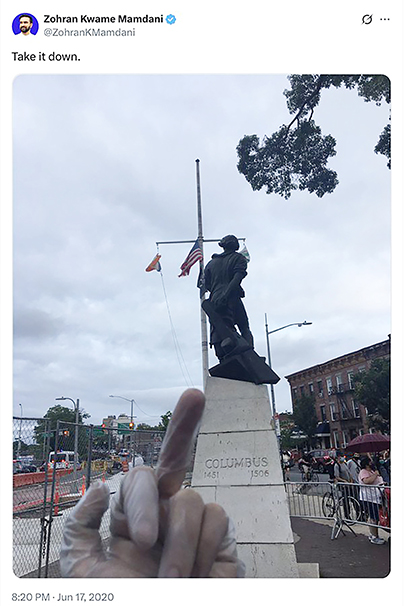 New York ranks among the most complex municipalities in the nation, with fractured finances and looming service boycotts. Yet Mamdani proposes to massively expand the city payroll—childcare workers, transit staff, grocery employees—and enforce a $30 minimum wage by 2030, funded via millionaires taxes and corporate levies.
New York ranks among the most complex municipalities in the nation, with fractured finances and looming service boycotts. Yet Mamdani proposes to massively expand the city payroll—childcare workers, transit staff, grocery employees—and enforce a $30 minimum wage by 2030, funded via millionaires taxes and corporate levies.
But raising $10 billion in such taxes could fail amid state legislature resistance and corporate flight. Moreover, ballooning an already bloated workforce strains pension obligations and pension liabilities, making long-term fallout likely. Time warns against the “nationalizing utilities” blueprint as fiscally unsound.
Damage to National Democratic Brand
New York sets the tone for the national Democratic narrative. Electing a socialist mayor—especially one mired in ideological controversy—risks associating Democrats with radical policies. This could:
- Drive moderate voters toward Republicans
- Trigger targeted GOP campaigns (as witnessed)
- Destabilize Biden’s messaging on common-sense progressive governance
Mamdani’s rhetoric and platform don’t cohere with the post‑Biden Democratic identity, which emphasizes responsible budgeting and inclusive pluralism.
The Stakes Are Too High
Zohran Mamdani’s rise represents more than a left‑wing insurgency—it’s a decision point for New York City and the Democratic Party.
- His ambitious, ideology-driven policies risk undermining private-sector growth, public services, and governance infrastructure.
- His inflammatory rhetoric over Intifada and Israel threatens key Democratic constituencies and opens the party to national backlash.
- His limited experience and management inexperience raises doubts about execution.
Mamdani’s candidacy could dismantle the delicate coalition that Democrats have painstakingly built—from labor to professionals, minority communities, and moderates. New York needs reform—but not a radical takeover that prioritizes ideological purity over practical solutions, administrative competence, and coalition unity.
A re-examination of Mamdani’s suitability is overdue. New York—and the nation—deserve leaders who can translate progressive ideals into effective governance without jeopardizing stability or diluting the broader Democratic vision.
About the Author:
Dr. Mohini Shinde
Dr. Mohini Shinde is a professor of religions of India and has taught Hindu religion and world religion in several US universities before her retirement. Her research was on religion and politics in South Asia. In her research engagements, she lived several years in India where she studied vedas and upanishads. She lives in California with her husband.

















